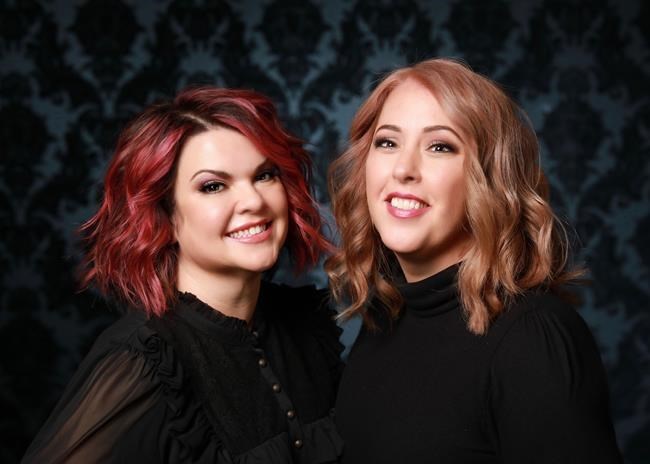TORONTO — You would be forgiven for thinking Christina Lauren's latest romance novel stars a hunky reimagining of Loblaw chairman Galen G. Weston.
The hero of "The Paradise Problem" is, after all, described as an heir to Weston Foods, the "heartless corporation his family built from the ground up."
But Christina Hobbs and Lauren Billings, the best-selling American writing duo behind the book and the combined pen name, say Liam (West) Weston is not an analog for Galen Jr., and any similarities really are coincidental.
"We did not know that there was a grocery family," said Billings. "We had no idea. Somebody told us this two weeks ago and we were like, 'Oh God, I hope that's not weird.'"
"I did Google, because I was like, 'OK, are they hot?'" she added, requesting that her conclusion stay off the record.
Though the Weston connection wasn't deliberate, the writers said, there are several intentional nods to Canada in the book for their friends and readers north of the border. The heroine is named Anna Green, as in "Anne of Green Gables," and there's a special edition of the book that features a bonus scene in which West and Anna travel to Canada to get married. (Not a spoiler, as all romance novels end happily.)
And while the parallels between the real-life Weston and the fictional West are clear — and the timing fortuitous, given that the book comes out in the midst of a Loblaw boycott — the similarities do end at a certain point.
West is described as having "eyes the colour of sunlight passing through a glass of whiskey" and "hair that is that exact same colour but with more sunlight streaking through, and so thick I suspect it alone has ruined me for other men."
Weston's eyes are blue.
But further to that, before joining the family business, Weston was an investment banker in the U.K. At the outset of the book, West is a Stanford professor who is disillusioned with his family's grocery empire and all it represents.
Billings and Hobbs hope that makes it easier for readers — particularly those in Canada — to root for West's happily ever after.
In this "eat the rich" era, the authors said, the billionaire archetype can no longer fit cleanly in the "hero" category — a dynamic they wanted to explore in this novel, their 30th together.
"Romance has always loved a billionaire," said Billings. "In general, the billionaire trope is done in a way that it's like, he's young, he's sexy, he's kind, he's progressive...those things don't usually coexist.
"Most billionaires aren't known for being really great, grounded, wonderful, ethical people."
While West is all those things, the Westons in "The Paradise Problem" are anything but wonderful, which is part of why Billings and Hobbs made their hero an heir to a grocery chain to begin with.
"It's like it's your neighbourhood grocer. You see the picture of the owner and they're sweet and lovely and down to earth and all these things, when in reality they're just sort of nightmares," Hobbs said.
They sought to subvert expectations in general with "The Paradise Problem."
Their first book, adapted from a particularly successful work of "Twilight" fanfiction and published more than a decade ago, also featured a rich hero who introduced his love interest to a world that's out of reach to all but the one per cent.
But that book, "Beautiful Bastard," took a relatively uncritical look at the broader implications of one person having so much wealth.
"Our books now are a bigger world and a bigger story, and we're exploring bigger themes outside of the romance," Hobbs said. "But obviously the romance is always going to be central to the novel itself."
The romance genre has always had an element of fantasy that allows its mostly female readers to romanticize things they might find unappealing in real life — an "alpha" hero who is aggressive and ambitious, for example.
That used to be how they wrote their books, Billings and Hobbs said, but over the last decade they've moved toward romanticizing the regular.
"Romance as an idealized world is something that's existed forever. But what I think Christina and I really want to do is romance as a realistic idealized world," Billings said. "Every consenting adult should get their happily ever after, and every happily ever after should have a stable and supportive community."
In "The Paradise Problem," they said, the "realistic" character is Anna, a starving artist who lives with a roommate and loses her job at a convenience store.
"In this book, Anna is the aspirational one, for me at least," Billings said. "She starts the book with nothing. She can barely afford to pay her bills. But she is still the person that we are rooting for, whose life we are envying at some point, because she is so grounded in herself and who she is."
The fantasy comes from the setting, the private island where West takes Anna for a family wedding.
Readers can luxuriate in the exclusive locale and marvel at the riches Billings and Hobbs describe. But at the same time, they can take comfort in the knowledge that being that wealthy comes with drawbacks.
"It was fun for us to both take that escapism of the island and the lush setting of the wedding, but also kind of try and ground it in a little bit more of reality of what a billionaire family might feel like to be around," Hobbs said.
This report by The Canadian Press was first published May 14, 2024.
Nicole Thompson, The Canadian Press



